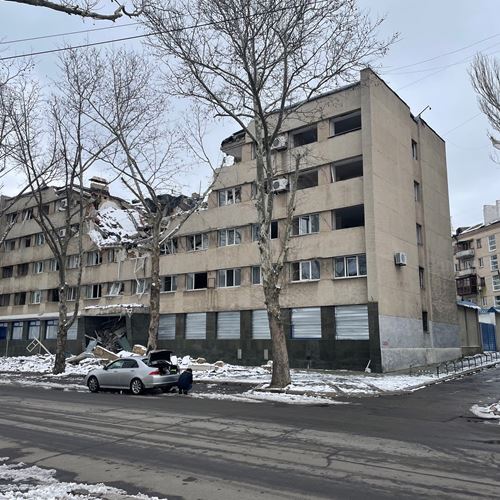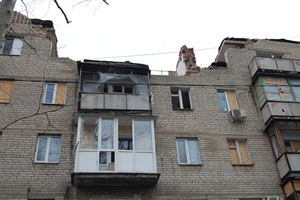News
DRC presence in southern Ukraine to reach newly accessible areas
With areas in south of Ukraine recently accessible for humanitarian assistance, the Danish Refugee Council (DRC) expands presence with an office in Mykolaiv. Initial activities are launched as part of new efforts to respond to the immense needs for support in areas heavily damaged and affected by the war.

The new office in Mykolaiv is part of the Danish Refugee Council’s (DRC) efforts to reach people in areas of Ukraine that have recently become accessible. Months of shelling have left trails of destruction and devastation with extensive and urgent needs for humanitarian aid. In connection to the most recent expansion, DRC’s Secretary General visited areas of southern Ukraine.
“There are hardly words to describe the scale and magnitude of destruction in Ukraine, including areas in the south. More areas have recently become accessible after many months of intensive fighting and shelling, and here I saw how entire communities are literally left in ruins” Charlotte Slente, Secretary General of DRC Danish Refugee Council said.
DRC has already delivered urgently needed water treatment stations in Mykolaiv with more to follow along with plywood and construction materials for emergency repairs of homes and public buildings. During her visit to Mykolaiv, DRC’s Secretary General met the President of Ukraine, Volodymyr Zelensky to see some of the work carried out with Danish support. Charlotte Slente also met with the Governor of Mykolaiv Region and the Mayor of Mykolaiv City as well as representatives of Civil Society to forge new partnerships and reassure commitment to support vulnerable and exhausted communities where the past year of war has depleted human and financial coping capacity.
“I have seen the toll of war on residential areas, on schools and on critical infrastructure. And I have seen missiles sticking up from the ground close to houses making you wonder what other dangerous unexploded remnants of war remain hidden under the debris and snow. The need for immediate mine action responses and long-term humanitarian support is evident”, Slente said.
Since 24 February 2022, hostilities in Ukraine are estimated to have displaced a third of the population once counting 44 million. As the war continues to escalate, innocent lives are threatened and lost every day, while the extent of human suffering is increasing, leaving a crisis and devastation of historical proportions. The entire nation is on the brink of an even larger crisis due to continued contamination and risks related to explosive remnants of war threatening lives and livelihoods.
“With military hardware support dominating headlines, it’s important to stress the importance of focus and resources invested in responses to both immediate and long-term humanitarian needs. Even if the war was to stop tomorrow, it will take years maybe decades for many people to get back on their feet, and to clear areas that have been contaminated by enormous amounts of explosive remnants of war”, Slente said.



